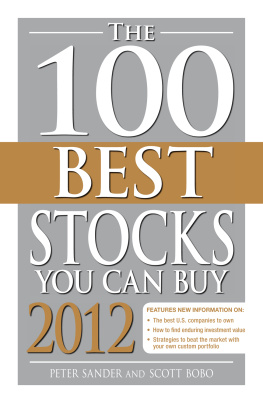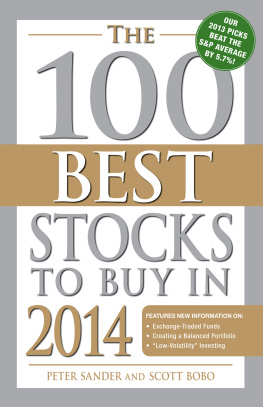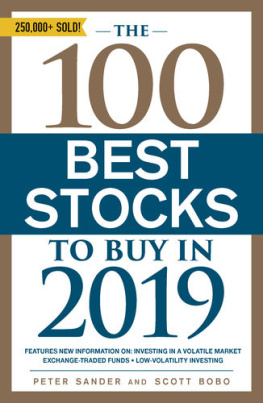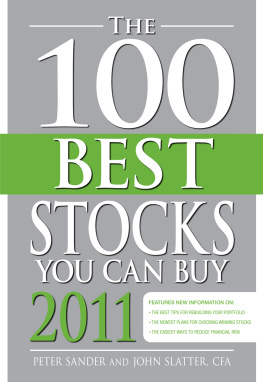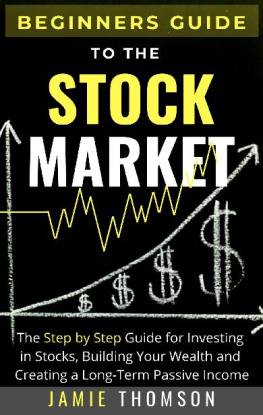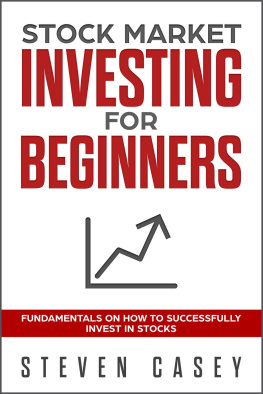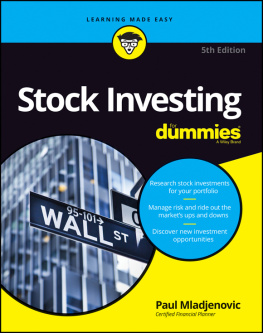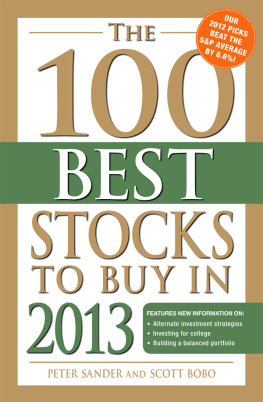The Art and Science of Investing in Stocks
Peter Sander
Congratulations (once again if youre a perennial reader) on your purchase of the 2012 edition of The 100 Best Stocks You Can Buy.
If you bought this book, youre probably an astute and experienced individual investor who invests in individual stocks in individual companies. Now, that might not seem so profound, but with some 10,000 mutual funds, 8,000 hedge funds, and countless exchange traded funds (ETFs) and index funds out there, its not inconceivable that the individual stock investor is becoming an endangered species.
But thats just not so. For not only your own wealth but also for the efficient allocation of capital to businesses and ideas that work best, millions still engage in this sort of pure investing for all or part of their wealth. Yet, much of what we hear about in the financial media these days is still about mutual funds, hedge funds, ETFs, and other investment products. Are the media catering to your needs or to the needs of the professional fund manager? One wonders sometimeseither way, we do exist, but we tend to exist rather quietly. Anyway, off the soapbox. Even if you buy just a few shares of one company, youre an individual investor. Youre participating actively in the economy, and youre buying your share of the company with hopes of participating in its success. Like a homeowner choosing to take part in the work of owning a home as a do-it-yourselfer youre participating in the individual satisfaction, responsibility, and control that comes with doing it yourself.
If you succeed, you accept the benefits of increased wealth (and reduced fees) along with the satisfaction and sense of accomplishment of doing it yourself. If you fail, its true youll have no one to blame but yourself. But at least you wont be forced to drink the poison of having someone else lose your money for you. In the entrepreneurial spirit that so characterizes America and much of the Western world, youll pick yourself up, dust yourself off, learn from the mistakes, and go out and try it again.
Every edition of The 100 Best Stocks You Can Buythis 2012 edition includedis intended to be a core tool for the individual investor. Sure, its hardly the only tool available. Todays explosion of Internet-based investing tools has made this book one of hundreds of choices for acquiring investing information. With the speed of cyberspace, our book will hardly be the most current source. In factwell admit by way of a disclaimerthat because of the typical book publication cycle, were at least six months out of date. If you check our research, youll be able to come up with two to as many as four quarters of more current financial information, news releases, and so forth.
Does that make our book a poor information source? Not at all. Unless youre watching the news wires in real time, regardless of what information source you use, there will probably be some room for a current refresh or update. More to the pointthe companies we choose are chosen in large measure because things dont change so much, and because they avoid the temptation to manage short-term, quarter-to-quarter performance. The companies we choose are chosen because they have sustainable performance, so who cares if the latest figures or news releases are in? In 100 Best Stocks You Can Buy 2012, as with all of our previous editions, we focus on the story, not just the latest facts and figures.
As such, 100 Best Stocks is intended as a handy guide and core reference for your investing; not as a be-all end-all investing source. Thus, as much as a source of facts and numbers itself, 100 Best Stocks is intended to present the story for each company and to serve as a model for selecting the best companies and stocks to invest in.
To that same point, 100 Best Stocks goes well beyond just being a stock screen or a study of stocks to invest in. Analysis forms the basis of 100 Best Stocks, but it isnt the rigid, strictly numbers-based selection and analysis so often found in published best stocks list. Sure, we look at earnings, cash flow, balance sheet strength, and so forth, but well also look far beyond those things. Well look at the intangible and often subtle factors that make truly great businessesthat is, companiesgreat. That, once again, is the

